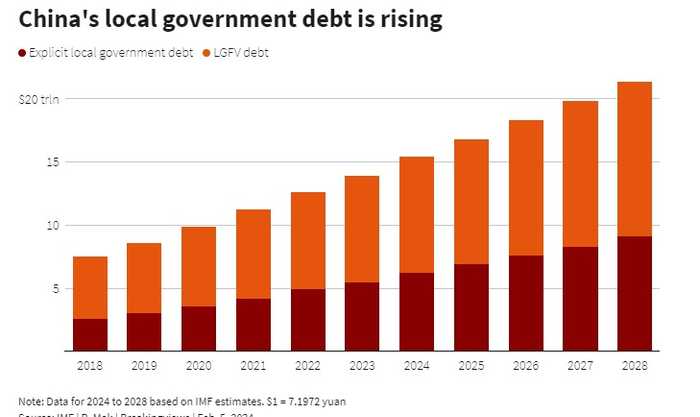Published 14:57 IST, February 5th 2024
IMF’s China gloom gets lost in translation
The IMF expects the world's second-largest economy to grow 4.6% this year.
- Republic Business
- 3 min read

Glass half full. Does China's economy look worse to outsiders? Yes, if Beijing's rebuttal to the International Monetary Fund's latest detailed assessment of the $18 trillion economy is anything to go by. Countries rarely agree in entirety with the multilateral institution but the disagreement is a dampener for those hoping for a bolder policy boost.
The IMF strikes an urgent tone in its Article IV Staff Report. It expects the world's second largest economy to grow 4.6% this year, from 5.2% in 2023, as a real estate crisis and weak external demand take a toll. Moreover, a buildup of local government debt, aging population and other "existing large imbalances" pose high levels of risk and uncertainty. A comprehensive strategy is "urgently needed" to contain these risks; looking further ahead, paltry growth of around 3.5% is forecast in 2028.
The dim outlook jars with Beijing's attempts to project confidence to the world. "The entire country is filled with optimism" a headline in The People's Daily proclaimed on Friday, the same day as the IMF's release. Premier Li Qiang declared in January at Davos, just days after the IMF consultation ended, that the Chinese economy was making steady progress. Even the precipitous plunge in Chinese equities, falling consumer prices, and last week's court order to liquidate China Evergrande, the world's most indebted property developer, have not stirred the government into unleashing extensive fiscal stimulus. The IMF, China says, is too pessimistic.
On local government debt, there is some alignment on the extent of the problems. The pair disagree on how to classify the borrowings of local government financing vehicles (LGFVs) but the IMF estimates combined debt at local governments and their financing vehicles to be 110 trillion yuan ($15 trillion), more than double the level in 2018 and almost 83% of GDP, and urges restructuring via writedowns and asset sales. Beijing concedes the trend of "uncontrolled expansion" has been "curbed to some extent" and if necessary insists the central bank will offer emergency liquidity to regions with high debt burdens.

Yet there is less agreement on the property sector. In the 2022 report, Chinese officials disputed there was even a crisis. This time, they say the fund exaggerates the scale and impact of the real estate contraction. Recent data show government revenue from land sales rose year-on-year for the first time in two years in December, while average new home prices across 100 cities rose for a fifth consecutive month. Beijing disputes the IMF's projected 50% decline in demand for new housing over the next decade.
The fundamental difference is that Beijing sees the property sector and other aspects of the economy "stabilizing and recovering". That big picture view may ultimately determine how much President Xi Jinping rushes to prop up the stock market or stimulate real activity. For now, Xi doesn't appear ready to blink.
Updated 14:57 IST, February 5th 2024